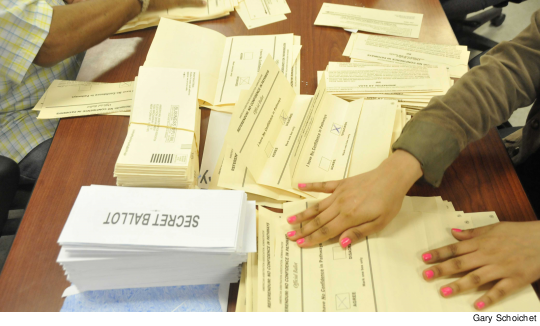 |
In a referendum on Pathways, the CUNY administration’s overhaul of general education, 92% said they have “no confidence” in the new curriculum. More than 60% of the 7,202 eligible voters took part in the referendum among full-time faculty, which was conducted by the American Arbitration Association at the request of the PSC.
There were 3,996 votes supporting a statement of no confidence; 323 votes against; and three voided ballots. The landslide result, combined with the high level of participation, means that an absolute majority of CUNY’s full-time faculty has expressed its lack of confidence in the administration’s new curriculum, which is scheduled to go into effect this Fall.
Stunning Rebuke
“The vote is a stunning rebuke to the Pathways curriculum and the coercive measures used to impose it,” said PSC President Barbara Bowen, an associate professor of English at Queens College and the Graduate Center. “With a new interim chancellor about to take office and Trustees’ Chair Benno Schmidt’s term soon to expire, the moment is right to repeal and rethink Pathways.”
Press coverage of the vote included articles in The New York Post, The Chronicle of Higher Education, and Inside Higher Ed. The vote was “an overwhelming thumbs-down to the controversial Pathways program,” the Post reported.
“Our students deserve an education that is broad, deep and rigorous – but Pathways undermines these goals,” Alex Vitale, associate professor of sociology at Brooklyn College, told the Post. “The level of faculty opposition to Pathways is unprecedented because our students’ futures are at stake.”
The no-confidence referendum offered “a unique opportunity to talk to our colleagues and engage them,” said Alan Feigenberg, a professor of architecture at City College and PSC chapter chair. “It was an opportunity to discuss not only the issues, but also the importance of our union and of organized resistance.”
“It was indeed a wonderful organizing experience,” agreed Judy Barbanel, outgoing chapter chair at Queensborough Community College and a professor of academic literacy. “I spoke to and got to know many faculty I had never met before, and who had never attended a union chapter meeting. It was an exhausting, but exhilarating experience, and I am thrilled that the results were so strong.”
The PSC Delegate Assembly saw debate over the structure of the referendum, with some delegates objecting to the Executive Council’s decision to organize it as a vote among CUNY’s full-time faculty. A motion for the vote to include part-time faculty as well as professional staff, while excluding anyone who is not a union member, failed by a vote of 50 to 15. Adjuncts, full-time faculty and professional staff were each found on both sides of the vote.
Critics argued that Pathways is a union issue and affects all members, so all union members should vote. Not to do so, they argued, would be exclusionary, and would perpetuate CUNY’s two-tier system, while including all union members would build a more united union. Those who voted not to change the referendum said that it was a strategic decision, based on a realistic assessment of how CUNY is organized today, where the Bylaws assign responsibility for formulating policy on curriculum to the full-time faculty. When some departments and college senates have voted under pressure to approve Pathways courses, they said, management has claimed that this shows Pathways has faculty support. A no-confidence vote by a clear majority of the full-time faculty, they argued, would counter such claims.
Empowering
The referendum was conducted between May 9 and May 31, and results were announced June 1. “The result of the referendum empowers us at a critical moment,” Bowen wrote in a message informing members of the outcome. “Equipped with this landslide vote, we can take the campaign to a new level [and] continue the fight in the Fall.”
“No one can deny that there is massive faculty opposition to Pathways in its present form,” said PSC Treasurer Mike Fabricant, a professor at the Hunter School of Social Work, and former executive officer of CUNY’s doctoral program in social welfare. “This is a call for management to begin to negotiate on where we go from here.”
“The rush to implementation is deepening the problems with the whole Pathways project,” Fabricant observed, “and the rotten fruit of this process will be with us in the fall.” But as students encounter the reality of Pathways and as the courses are reviewed, he said, faculty will have both the opportunity and responsibility to speak up in favor of a more rigorous curriculum. “We’re not only going to be watching, but acting,” Fabricant said. “Pathways will come under scrutiny of a unified, vigilant faculty across the University.”
______________________________
RELATED COVERAGE
PSC Members Speak: Why I Voted No Confidence in Pathways
In Rush to Implement Pathways, Administrators Usurp Faculty’s Role
Points of Contention in the Pathways Debate

